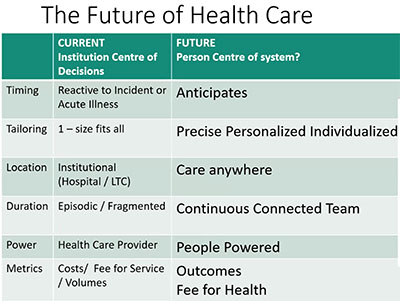
If two 10-year-olds and two 80-year-olds walks into the doctor’s office with a cold there will not be much difference in what the doctor considers before recommending a medicine for the 10-year-olds. Those two 80-year-olds, however, may have two profoundly different and complex health and social histories to consider before the doctor can recommend a medicine.
 That is the first key message Dr Jennifer Ingram shared with the Rotary Club of Kingston, Rotarians. Dr Ingram, an award-winning, specialist in Internal and Geriatric medicine has been a pioneer in creating and advocating community-based systems of care for complex seniors.
That is the first key message Dr Jennifer Ingram shared with the Rotary Club of Kingston, Rotarians. Dr Ingram, an award-winning, specialist in Internal and Geriatric medicine has been a pioneer in creating and advocating community-based systems of care for complex seniors.Ingram believes one-size-doesn’t-fit-all, especially when it comes to those with dementia. Dementia she said, is the “umbrella term” for those aged whose brains are changing functionally. Alzheimer's disease makes up eighty per cent of dementia patients, however, the other 20 per cent can exhibit a wide range of symptoms from pre-dementia to Alzheimer’s. The aged can take five or more years to progress through these stages and this presents an opportunity “to make it possible for us to live at home and do all the things that bring us joy” she said.
 Unfortunately, a graph shared by Dr Ingram showed that Canada has one of the lowest spendings per capita on Home Care of any of the OECD countries. Denmark, Poland, New Zealand, and Austria are four countries that spend more on Home Care than Institutional Care.
Unfortunately, a graph shared by Dr Ingram showed that Canada has one of the lowest spendings per capita on Home Care of any of the OECD countries. Denmark, Poland, New Zealand, and Austria are four countries that spend more on Home Care than Institutional Care.Denmark has made the most progress in the transition from institutional care to home care. Home nursing is free even if it is permanent. They have gone from 44 LTC beds per 1000 (the international average) to 14 LTC beds per 1000. Ontario has 30 beds per 1000.
“Denmark,” she said has a “person-centred system, while we have a system which says our patient much fit the algorithm we have established for the province.”
Dr Ingram praised a Kingston system, founded by Christine McMillan called Oasis where an apartment complex becomes the place where they have developed their home care system the way they want it. They have a coordinator that they hire, an on-site board of directors and a larger space in their apartment building for people to congregate. Ingram would like to see the province establish building permits and codes to require such features where a sizable number of seniors live. She would also like to see adult day programs created for neighbourhoods where large numbers of seniors live, often in isolation.
 Other topics covered by Jennifer were the role of community volunteers assisting complex seniors, the savings generated by home care programs compared to LTC institutions and especially those housed in hospitals, and the positive role of pets and music in the life of complex seniors.
Other topics covered by Jennifer were the role of community volunteers assisting complex seniors, the savings generated by home care programs compared to LTC institutions and especially those housed in hospitals, and the positive role of pets and music in the life of complex seniors.To describe her future model Dr Ingram said, “I hope we move more towards a different person-centred approach where every publicly funded recreational place is expected to have programs that would be appropriate for individuals with cognitive and physical difficulties.”
At present, she added, “LTC institutions cost three to five times more than home care, so we need our governments to assist across the board in a much more predictable fashion.”
View and Listen to Dr Ingram's Presentation
Further Reading
- Health Standards Organization (HSO) launches Public Review on new draft National Long-Term Care Services Standard and releases What We Heard Report #2 - HSO Health Standards Organization
- Globe editorial: The biggest issue in Canada’s long-term care homes? A desperate lack of beds - The Globe and Mail

